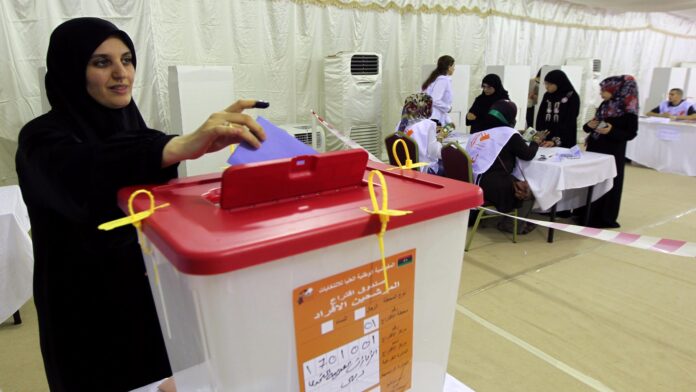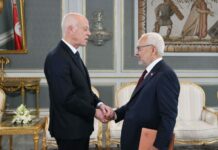May 26, 2021
On Wednesday, May 26th, the Libyans’ and neighboring countries’ attention turns towards the Libyan Political Dialogue Forum, which will be held via the “Zoom” application on Wednesday and Thursday to discuss the proposed constitutional base for the presidential and parliamentary elections, prepared by the legal committee emanating from the forum.
This meeting comes amid diminishing opportunities for holding the elections as scheduled on the 24th of December 2021, in addition to the emergence of a new constitutional problem regarding what the outcomes of the forum could create in terms of a collision with the work of the founding body to draft the constitution in Libya.
International and Internal Conflict
The main reason for obstructing the holding of the Libyan elections in Libya revolves around the struggle of the major countries to share the cake, and especially the consequences of the fighting between Libyans over the past 7 years.
Fears among the Libyans escalate with the continued flow of weapons to the two conflicting parties, and skirmishes that could pave the way for the outbreak of war between them again in light of the continuing so-called mercenary crisis.
Warlords
In a statement to “JDD Tunisie”, the Libyan political analyst, Ezzeddin Akeel, confirmed that he had reservations about the UN plans to restore stability inside Libya, describing them as being an illusion.
Akeel added that in all cases similar to Libya, the so-called warlords meet around a negotiating table in order to determine the mechanisms for disarmament and dismantling the armed militias to reconfigure the army and police institutions, but the United States, Britain and the United Nations “gave their backs” to the warlords in light of the continuous fighting of armed groups concerning influence and money on Libyan soil, which does not herald the return of stability soon.
“The warlords will not allow the immigrant and the displaced to return to the homeland, especially since among them are qualified and elites who wish to run for high office in Libya,” he said, adding, “They will change the ballot boxes and intimidate the electoral committees,” stressing that the premise of imposing fraudulent election results is very likely to happen.
Disarmament
Our interlocutor indicated that Libya needs to disarm and dismantle the militias, according to the recognition of the UN envoy, “Jan Kubis”, and that the implementation of the resolution requires an international mission led by a general and soldiers in blue caps and does not need a political mission like what is being promoted.
He added that Kubic does not dare to take these decisions because by doing so, he will give up the privileges he enjoys from a monthly salary of more than 50 thousand euros in addition to the private plane and the presidential reception that he is receiving, saying that he is about to form a huge agenda in the name of Libya.
Expel Mercenaries?
Ezzeddin Akeel stated that demanding the UN mission to expel all mercenaries from Libya will not solve the problem, but on the contrary the warlords will play a major role during the elections scheduled to take place at the end of this year, according to his estimation, and affirmed that most of the mercenaries are either detained or forcibly engaged in hard work and receive bad treatment, as most of them want to return to their country.
Armed Local Militias
According to Akeel, the mercenaries were brought by the warlords and they represent a foothold for external powers such as Turkey and Russia. Besides, the United States and Britain are seeking in every way to expel them from the Libyan lands in order to serve their personal interests only.
He continued, “The Libyan people are no longer harmed by mercenaries as much as they are harmed by the local armed militias. They control border crossings and oil fields and smuggle about 80 thousand barrels of oil per day to sell them through parallel routes, and they reached the point of assassinating a Maltese journalist after revealing with documents the cooperation of the militias with the Italian mafia.”
Akeel pointed out that the militias still control the strategic road linking eastern and western Libya, and they always resort to blackmailing governments, as they have the ability to attack the institutions of sovereignty.











